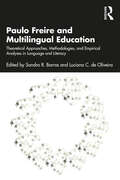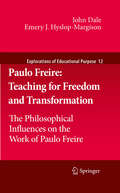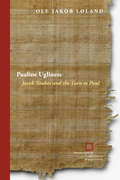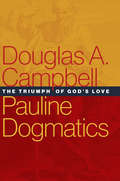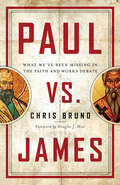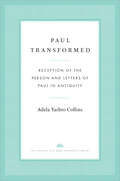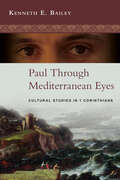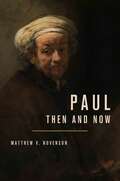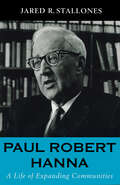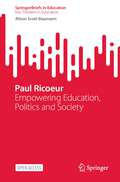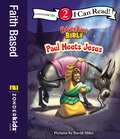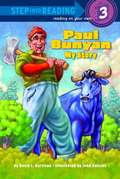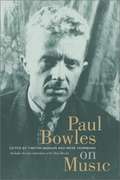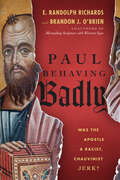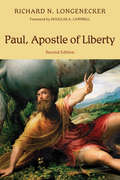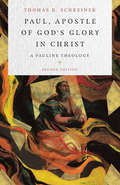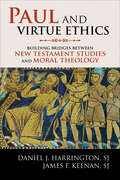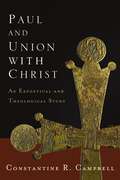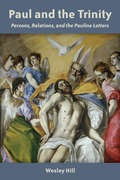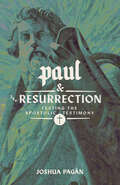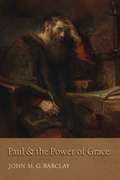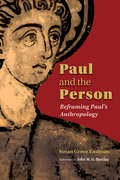- Table View
- List View
Paulo Freire and Multilingual Education: Theoretical Approaches, Methodologies, and Empirical Analyses in Language and Literacy
by Sandro R. BarrosThis collection celebrates the work of Paulo Freire by assembling transnational perspectives on Freirean-based educational models that reconsider and reimagine language and literacy instruction, especially for multilingual learners. Offering an international and comparative overview of Freire’s theories and critical pedagogies in relation to multilingualism, this volume presents innovative analyses and applications of theories and methods and features case studies in public schools, after-school and community literacy programs, and grassroots activism. Part I features chapters that expand on Freire’s concepts and ideas, including critical literacies, critical consciousness, and liberatory teaching principles. Part II features chapters that discuss empirical analyses from applied research studies that draw from these philosophical concepts, making important connections to key topics on supporting students, curriculum development, and teaching. Ideal for students and scholars in language education, bilingual/multilingual methods, and sociology of education, the volume informs teacher knowledge and practice. In offering alternative paradigms to our dominant, homogenized monolingual status quo, the chapters present a shared vision of what multilingual literacy can offer students and how it can transform educational spaces into sites of imagination, creativity, and hope.
Paulo Freire: Teaching for Freedom and Transformation
by John Dale Emery J. Hyslop-MargisonThe primary mission of this text is clarifying many of the misconceptions about Paulo Freire's theories, concepts and his implications for education. It revisits his ideas and explains more fully the philosophical influences that shaped concepts such as problem posing, conscientization and praxis. The fundamental thesis, then, is that the present absence of in-depth philosophical analysis leaves an unacceptable void in the literature addressing Freire's work, while also promoting frequent misconceptions and superficial understandings about his relationship to contemporary education. Indeed, the philosophical assumptions contributing to Freire's critical pedagogy require identification, unravelling and ultimately evaluation on the basis of their epistemic and moral tenability. Most existing applications of Freire's pedagogy are unfortunately superficial because they simply sloganize terms such as banking education, conscientization, praxis, and humanization. A slogan in education popularizes a concept or idea in a positive way, but offers very little in terms of critical reflection or analysis. In order to understand these terms and their origin and apply them as Freire intended, a far richer and more in depth examination of Freire is desperately needed. This text will provide precisely that type of examination.
Pauline Ugliness: Jacob Taubes and the Turn to Paul (Perspectives in Continental Philosophy)
by Ole Jakob LølandIn recent decades Giorgio Agamben, Alain Badiou, and Slavoj Žižek have shown the centrality of Paul to western political and philosophical thought and made the Apostle a central figure in left-wing discourses far removed from traditional theological circles. Yet the recovery of Paul beyond Christian theology owes a great deal to the writings of the Jewish rabbi and philosopher Jacob Taubes (1923–1987). Pauline Ugliness shows how Paul became an effective tool for Taubes to position himself within European philosophical debates of the twentieth century. Drawing on Nietzsche’s polemical readings of the ancient apostle as well as Freud’s psychoanalysis, Tabues developed an imaginative and distinct account of political theology in confrontations with Carl Schmitt, Theodor Adorno, Hans Blumenberg, and others. In a powerful reconsideration of the apostle, Taubes contested the conventional understanding of Paul as the first Christian who broke definitively with Judaism and drained Christianity of its political potential. As a Jewish rabbi steeped in a philosophical tradition marked by European Christianity, Taubes was, on the contrary, able to emphasize Paul’s Jewishness as well as the political explosiveness of his revolutionary doctrine of the cross.This book establishes Taubes’s account of Paul as a turning point in the development of political theology. Løland shows how Taubes identified the Pauline movement as the birth of a politics of ugliness, the invention of a revolutionary criticism of the ‘beautiful’ culture of the powerful that sides instead with the oppressed.
Pauline Dogmatics: The Triumph of God's Love
by Douglas A. CampbellThe eschatological heart of Paul&’s gospel in his world and its implications for todayDrawing upon thirty years of intense study and reflection on Paul, Douglas Campbell offers a distinctive overview of the apostle&’s thinking that builds on Albert Schweitzer&’s classic emphasis on the importance for Paul of the resurrection. But Campbell—learning here from Karl Barth—traces through the implications of Christ for Paul&’s thinking about every other theological topic, from revelation and the resurrection through the nature of the church and mission. As he does so, the conversation broadens to include Stanley Hauerwas in relation to Christian formation, and thinkers like Willie Jennings to engage post-colonial concerns. But the result of this extensive conversation is a work that, in addition to providing a description of Paul&’s theology, also equips readers with what amounts to a Pauline manual for church planting. Good Pauline theology is good practical theology, ecclesiology, and missiology, which is to say, Paul&’s theology belongs to the church and, properly understood, causes the church to flourish. In these conversations Campbell pushes through interdisciplinary boundaries to explicate different aspects of Pauline community with notions like network theory and restorative justice.The book concludes by moving to applications of Paul in the modern period to painful questions concerning gender, sexual activity, and Jewish inclusion, offering Pauline navigations that are orthodox, inclusive, and highly constructive. Beginning with the God revealed in Jesus, and in a sense with ourselves, Campbell progresses through Pauline ethics and eschatology, concluding that the challenge for the church is not only to learn about Paul but to follow Jesus as he did.
Paulette in Space
by Joan Fleiss Kaplan"These appealing decodable stories nurture early literacy development, which translates into building new readers' self-confidence. This, in turn, quickens the pace at which genuine reading comprehension is achieved ..."--Epsbooks.com.
Paul vs. James: What We've Been Missing in the Faith and Works Debate
by Chris Bruno"I welcome Chris Bruno&’s readable and thoroughly biblical exploration of faith and works. He sets the matter in both its wider biblical context at the same time as he makes clear its relevance and importance to faithful Christian living today." –Douglas J. Moo from the ForewordEverything you never knew about the men behind the controversy.Put James and Paul next to each other and some tough-to-answer questions come up. Paul says we&’re saved by faith alone, not works—and James seems to say the opposite. If you&’ve been around the church for a while, you probably know enough to say "the right thing" if someone asked about these verses. But would your answers hold up to scrutiny? If pressed, would you know what to say? Dive into the life stories of both apostles, learn more about the context of their letters, and discover the truth about the shared message they both proclaimed. No more canned answers or lingering questions, gain confidence and go deeper in Paul vs. James.
Paul vs. James: What We've Been Missing in the Faith and Works Debate
by Chris Bruno"I welcome Chris Bruno&’s readable and thoroughly biblical exploration of faith and works. He sets the matter in both its wider biblical context at the same time as he makes clear its relevance and importance to faithful Christian living today." –Douglas J. Moo from the ForewordEverything you never knew about the men behind the controversy.Put James and Paul next to each other and some tough-to-answer questions come up. Paul says we&’re saved by faith alone, not works—and James seems to say the opposite. If you&’ve been around the church for a while, you probably know enough to say "the right thing" if someone asked about these verses. But would your answers hold up to scrutiny? If pressed, would you know what to say? Dive into the life stories of both apostles, learn more about the context of their letters, and discover the truth about the shared message they both proclaimed. No more canned answers or lingering questions, gain confidence and go deeper in Paul vs. James.
Paul Transformed: Reception of the Person and Letters of Paul in Antiquity (The Anchor Yale Bible Reference Library)
by Adela Yarbro CollinsA fascinating reception history of the theological, ethical, and social themes in the letters of Paul In the first decades after the death of Jesus, the letters of the apostle Paul were the chief written resource for Christian believers, as well as for those seeking to formulate Christian thought and practice. But in the years following Paul's death, the early church witnessed a proliferation of contested—and often opposing—interpretations of his writings, as teaching was passed down, debated, and codified. In this engaging study, Adela Yarbro Collins traces the reception history of major theological, ethical, and social topics in the letters of Paul from the days of his apostleship through the first centuries of Christianity. She explores the evolution of Paul&’s cosmic eschatology, his understanding of the resurrected body, marriage and family ethics, the role of women in the early church, and his theology of suffering. Paying special attention to the ways these evolving interpretations provided frameworks for church governance, practice, and tradition, Collins illuminates the ways that Paul&’s ideas were understood, challenged, and ultimately transformed by their earliest audiences.
Paul Through Mediterranean Eyes: Cultural Studies in 1 Corinthians
by Kenneth E. BaileyChristianity TodayPaul was a Hebrew of the Hebrews, steeped in the learning of his people.But he was also a Roman citizen who widely traveled the Mediterranean basin, and was very knowledgeable of the dominant Greek and Roman culture of his day. These two mighty rivers of influence converge in Paul's first letter to the Corinthians.With razor-sharp attention to the text, Kenneth Bailey examines the cultural milieu and rhetorical strategies that shaped this pivotal epistle. He discovers the deep layers of the Hebraic prophetic tradition informing Paul's writing, linking the Apostle with the great prophets of the Old Testament.Throughout, Bailey employs his expert knowledge of Near Eastern and Mediterranean culture to deliver to readers a new understanding of Paul and his world. Familiar passages take on a new hue as they are stripped of standard Western interpretations and rendered back into their ancient setting.
Paul, Then and Now
by Matthew V. NovensonReckoning with the hermeneutical struggle to make sense of Paul as both a historical figure and a canonical muse. Matthew Novenson has become a leading advocate for the continuing relevance of historical-critical readings of Paul even as some New Testament scholars have turned to purely theological or political approaches. In this collection of a decade&’s worth of essays, Novenson puts contextual understandings of Paul&’s letters into conversation with their Christian reception history. After a new, programmatic introductory essay that frames the other eleven essays, Novenson explores topics including:the relation between theology and historical criticismthe place of Jews and gentiles in Paul&’s gospelPaul&’s relation to Judaismthe relevance of messianism to Paul&’s ChristologyPaul&’s eschatology in relation to ancient Jewish eschatologiesthe aptness of monotheism as a category for understanding antiquitythe reception of Paul by diverse early Christian writersthe peculiar place of Protestantism in the modern study of Paulthe debate over the recent Paul-within-Judaism movementanti-Judaism in modern New Testament scholarshipdisputes over Romans and Galatiansthe meta-question of what it would mean to get Paul right or wrong Engaging with numerous schools of thought in Pauline studies—Augustinian, Lutheran, New Perspective, apocalyptic, Paul-within-Judaism, religious studies, and more—while also rising above partisan disputes between schools, Novenson illuminates the ancient Mediterranean context of Paul&’s letters, their complicated afterlives in the history of interpretation, and the hermeneutical struggle to make sense of it all.
Paul Robert Hanna: A Life of Expanding Communities
by Jared R. StallonesAnalyzing and ultimately placing in context Paul Hanna's vast contributions, this book provides a richly textured narrative of his life and his major role in twentieth-century American education and the development of modern American education.
Paul Ricoeur: Empowering Education, Politics and Society (SpringerBriefs in Education)
by Alison Scott-BaumannThis open access book employs Paul Ricoeur's methodologies to identify, challenge, and replace with responsible language the many continuing abuses of power, including in the university curriculum and in the international discourse of right-wing populism. Using Ricoeur’s philosophy, the book provides a meta-frame for current debates about the university and a pragmatic micro-frame for supporting staff and students to develop important conversations on campus. It introduces the Community of Inquiry approach and describes its use to engage with complex ideas on which society has recently become silent. By contrasting Ricoeur’s work on Algeria and his work in Chicago, USA, .a bias blind spot is revealed in his desire for dialectical balance and reciprocity. This prevented him (and for some years the author) from accepting the connections between colonialism, slavery and racism and the urgent need for reparative justice. With Ricoeur, the readers can think differently: how to recognize and tackle racism and the democratic deficit, how to reduce epistemic injustice by learning how to speak out, how to move away from forced polarities and develop a pedagogy of hope as well as an acceptance of provisionality and the intractability of certain existential problems.
Paul Meets Jesus: Level 2 (I Can Read! / Adventure Bible)
by ZondervanPaul disliked the followers of Jesus. He worked very hard to hurt anyone who loved him. He even tried to throw them all in jail. But one day Jesus met him on the road to Damascus. Find out what happened next to Paul in this Level 2 I Can Read written and illustrated in the style of the bestselling NIV Adventure Bible.Perfect for beginning readers ages 4-8, learning Bible stories on their own.
Paul Bunyan: My Story
by David L. HarrisonIt's time for YOU! Pick your favorite spot to read. This is going to be a great book! What this book is about . . . Paul Bunyan: My Story Paul Bunyan is a mighty lumberjack with tons of tall tales to tell. Sit back and enjoy as he shares them in his own special way.
Paul Bowles on Music
by Paul Bowles Timothy Mangan Irene HerrmannThis volume collects the music criticism Bowles published between 1935 and 1946, with an interview conducted by Irene Herrmann shortly before his death.
Paul Behaving Badly: Was the Apostle a Racist, Chauvinist Jerk?
by E. Randolph Richards Brandon J. O'BrienThe apostle Paul was kind of a jerk.
Paul, Apostle of Liberty: The Origin And Nature Of Paul's Christianity
by Richard N. LongeneckerPaul’s teachings are vital to the Christian gospel, so the turbulent, long-running debate over how to interpret Paul’s message is crucially important. Richard Longenecker’s Paul, Apostle of Liberty has long stood — and still stands — as a significant, constructive, evangelical study of Paul’s theology, especially of the creative tension between law and liberty that runs throughout his thought. When this book was originally published in 1964, Longenecker then presciently anticipated several subsequent debates, addressing many of the same questions that such scholars as E. P. Sanders and Richard Hays did years later. This second edition of Paul, Apostle of Liberty includes a substantial foreword by Douglas Campbell and a lengthy addendum by Longenecker discussing the major developments in Paul studies over the past fifty years.
Paul, Apostle of Liberty: The Origin And Nature Of Paul's Christianity
by Richard N. LongeneckerPaul&’s teachings are vital to the Christian gospel, so the turbulent, long-running debate over how to interpret Paul&’s message is crucially important. Richard Longenecker&’s Paul, Apostle of Liberty has long stood — and still stands — as a significant, constructive, evangelical study of Paul&’s theology, especially of the creative tension between law and liberty that runs throughout his thought. When this book was originally published in 1964, Longenecker then presciently anticipated several subsequent debates, addressing many of the same questions that such scholars as E. P. Sanders and Richard Hays did years later. This second edition of Paul, Apostle of Liberty includes a substantial foreword by Douglas Campbell and a lengthy addendum by Longenecker discussing the major developments in Paul studies over the past fifty years.
Paul, Apostle of God's Glory in Christ: A Pauline Theology
by Thomas R. SchreinerThe theology of the apostle Paul is complex, set forth in numerous occasional letters, and subject to a seemingly endless variety of interpretations. How should students of Scripture engage the challenging task of discerning the shape of Paul's thought?Paul, Apostle of God's Glory in ChristPaul, Apostle of God's Glory in Christ
Paul and Virtue Ethics: Building Bridges Between New Testament Studies and Moral Theology
by Daniel J Harrington S.J. James Keenan SJDaniel Harrington, SJ, and James Keenan, SJ, approach moral theology through virtue ethics, asking the key questions, Who am I? Who do I want to become? And how do I get there? With the apostle Paul as a guide, the authors examine the virtues that flow from Scripture and provide a lens through which to interpret Scripture. They explore theological virtues faith, hope, and love; natural virtues and vices; social ethics, and sexual ethics.
Paul and Union with Christ: An Exegetical and Theological Study
by Constantine R. CampbellPaul and Union with Christ fills the gap for biblical scholars, theologians, and pastors pondering and debating the meaning of union with Christ. Following a selective survey of the scholarly work on union with Christ through the twentieth century to the present day, Greek scholar Constantine Campbell carefully examines every occurrence of the phrases ‘in Christ’, ‘with Christ’, ‘through Christ’, ‘into Christ,’ and other related expressions, exegeting each passage in context and taking into account the unique lexical contribution of each Greek preposition. Campbell then builds a holistic portrayal of Paul’s thinking and engages contemporary theological discussions about union with Christ by employing his evidence-based understanding of the theme. This volume combines high-level scholarship and a concern for practical application of a topic currently debated in the academy and the church. More than a monograph, this book is a helpful reference tool for students, scholars, and pastors to consult its treatment of any particular instance of any phrase or metaphor that relates to union with Christ in the Pauline corpus.
Paul and the Trinity: Persons, Relations, and the Pauline Letters
by Wesley HillPaul’s ways of speaking about God, Jesus, and the Spirit are intricately intertwined: talking about any one of the three, for Paul, implies reference to all of them together. However, much current Pauline scholarship discusses Paul’s God-, Christ-, and Spirit-language without reference to trinitarian theology.In contrast to that trend, Wesley Hill argues in this book that later, post-Pauline trinitarian theologies represent a better approach, opening a fresh angle on Paul’s earlier talk about God the Father, Jesus Christ, and the Spirit. Hill looks critically at certain well-known discussions in the field of New Testament studies -- those by N. T. Wright, Richard Bauckham, Larry Hurtado, and others -- in light of patristic and contemporary trinitarian theologies, resulting in an innovative approach to an old set of questions.Adeptly integrating biblical exegesis and historical-systematic theology, Hill’s Paul and the Trinity shows how trinitarian theologies illumine interpretive difficulties in a way that more recent theological concepts have failed to do.Watch a 2015 interview with the author of this book here:
Paul and the Resurrection: Testing the Apostolic Testimony
by Joshua A. PagánFor the contemporary believer, Paul's role in the historical setting of the Resurrection is far more than a matter of theological curiosity. The Christian justification for rational belief in the Resurrection is in large part anchored in Paul's justification for rational belief in the authenticity of his own experience. In Paul we find the earliest and best attested documentary evidence for a historical investigation of the miraculous event. Moreover, his epistles are an indispensable source of independent corroboration of the gospel narratives. Opponents of Christianity have formulated a variety of hypotheses to account for Paul's experience on the Damascus Road. Some propose that Paul was deceptive; others argue that he was deluded; and still others contend he came to believe a legendary development. Yet according to the Christian hypothesis, Paul's claim to have encountered the risen Jesus is dependable, and his testimony can be shown to withstand the scrutiny of critics. In this innovative, interdisciplinary study, PagÁn combines the analytic tools of history and philosophy to explore and evaluate competing explanations of Paul's belief in the Resurrection of Jesus.
Paul and the Power of Grace
by John M. BarclayPaul and the Gift transformed the landscape of Pauline studies upon its publication in 2015. In it, John Barclay led readers through a recontextualized analysis of grace and interrogated Paul&’s original meaning in declaring it a &“free gift&” from God, revealing grace as a multifaceted concept that is socially radical and unconditioned—even if not unconditional. Paul and the Power of Grace offers all of the most significant contributions from Paul and the Gift in a package several hundred pages shorter and more accessible. Additionally, Barclay adds further analysis of the theme of gift and grace in Paul&’s other letters—besides just Romans and Galatians—and explores contemporary implications for this new view of grace.
Paul and the Person: Reframing Paul's Anthropology
by Susan Grove EastmanIn this book Susan Grove Eastman presents a fresh and innovative exploration of Paul&’s participatory theology in conversation with both ancient and contemporary conceptions of the self. Juxtaposing Paul, ancient philosophers, and modern theorists of the person, Eastman opens up a conversation that illuminates Paul&’s thought in new ways and brings his voice into current debates about personhood.
